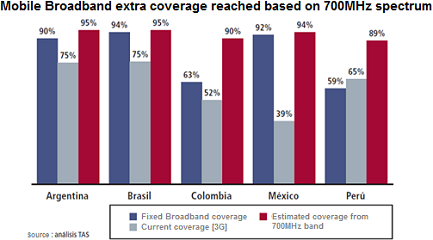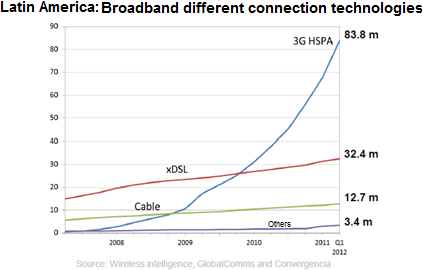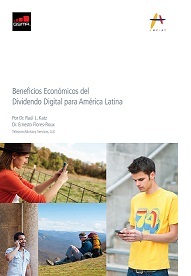A substantial amount of low-frequency spectrum is being freed up by the switchover from analogue to digital terrestrial television. This is known as the Digital Dividend. The 700MHz band (698–806MHz) offers an excellent balance between transmission capacity and geographic coverage. Because of the good propagation characteristics of radio signals in low frequencies, base stations can serve relatively large geographic areas, providing communications services in rural areas at a lower cost.
However, as the 700 MHz band is currently allocated to broadcasting services in many countries in Latin America, releasing Digital Dividend spectrum to enable universal mobile broadband requires a change in current paradigm.
What is the Digital Dividend?
Digital Dividend spectrum is defined as the upper part of the UHF band — 700MHz in the case of Latin America — and is currently allocated to broadcasting services in many countries in the region. As a result of the switchover from analogue to digital terrestrial television, more than 100MHz of spectrum will be freed up, enabling mobile operators to provide broadband services in this band. This represents more than 40% of the current spectrum allocated to mobile services, on average, in Latin American countries

Because the 700MHz band can provide higher transmission capacity to mobile services, it will enable mobile operators to respond to the growth of data traffic and improve indoor coverage. In many countries it is not necessary to wait for the analogue switch-off to free up the spectrum and use it to speed up broadband development.
The significance of the Digital Dividend for increased transmission capacity and coverage for mobile broadband
Latin America has experienced an explosion in the use of mobile broadband, with data traffic increasing exponentially. Additional spectrum is required to meet consumer demand. Today, the average amount of spectrum allocated to mobile is around 220MHz per country. The Digital Dividend allows an additional 90MHz to be added in each market.

Not only does the Digital Dividend create an efficient use of spectrum to keep up with the increasing demand for mobile broadband services from citizens, but by extending broadband networks to rural areas of the continent, it has the potential to make a significant social impact. In urban areas, the same band can improve signal reception in buildings.
The role of the Digital Dividend in democratizing internet access
The Digital Dividend offers a great opportunity to create universal access to broadband services in Latin America, if the 700MHz band is allocated for mobile broadband.
With this spectrum, coverage would reach up to 92.7% of the Latin American population, increasing coverage by up to 31.5%.

With an average annual growth of 6.8% in broadband usage in Latin America, the additional mobile broadband coverage would significantly increase broadband penetration, which is a public policy objective of most governments in the region.
Economic benefits from the Digital Dividend in Latin America
Increasing mobile broadband penetration in Latin America through the Digital Dividend will not only improve consumers’ lives but bring economic benefits including employment, productivity, competition and higher GDP. At the same time, it will lay the foundations for new commercial and public services such as eCommerce, eLearning, mobile health and many others.
In 2011, the GSMA commissioned research from AHCIET to better understand the potential economic benefits from the Digital Dividend in Latin America, measuring the impact of allocating the 700MHz band for mobile broadband services. Renowned researchers Raul Katz and Ernesto Flores- Roux (TelecomAdvisoryServices, or TAS) conducted  the study, the first to investigate this subject for Latin America.
the study, the first to investigate this subject for Latin America.
The concludes that allocating the 700MHz band to expand mobile broadband could contribute up to US$14.8 billion to the Latin American economy and spreading service coverage to 93% of the population. This figure represents the full economic impact generated by mobile broadband, starting from the auction of Digital Dividend spectrum and the acquisition of network infrastructure, support and marketing services. This greatly surpasses the projected benefits of allocating the band to digital television broadcasting over channel 51 — approximately US$3.5 billion.
Citizens demand mobile broadband with the same geographic coverage they have gotten with voice services, and with the same performance they experience with fixed-line broadband. In Latin America, mobile networks are the only effective way to provide widespread broadband, and Digital Dividend spectrum will play a key role in making this possible.
The Team
 Matías Fernández Díaz currently serves as Regulatory Manager at GSMA Latin America, based in Buenos Aires. He conducts GSMA LA regulatory and fraud initiatives, and coordinates operator working groups and task forces. Matias also represents the GSMA in international forums such as CITEL and is a key regional spokesperson on spectrum issues. Prior to joining the GSMA in 2009, he worked at IBM Global Delivery Center in Buenos Aires, Argentina. Matias is completing his Masters in Telecommunications Services in the San Andres University (UdeSA) and holds a Baccalaureate in Political Science (2005) from the Universidad Catolica Argentina (UCA).
Matías Fernández Díaz currently serves as Regulatory Manager at GSMA Latin America, based in Buenos Aires. He conducts GSMA LA regulatory and fraud initiatives, and coordinates operator working groups and task forces. Matias also represents the GSMA in international forums such as CITEL and is a key regional spokesperson on spectrum issues. Prior to joining the GSMA in 2009, he worked at IBM Global Delivery Center in Buenos Aires, Argentina. Matias is completing his Masters in Telecommunications Services in the San Andres University (UdeSA) and holds a Baccalaureate in Political Science (2005) from the Universidad Catolica Argentina (UCA).
 Luciana Camargos joined the GSMA in September 2012 as Senior Policy Manager responsible for Government and Regulatory Affairs. She graduated in electrical engineering from the University of Brasilia and has an MBA in Telecommunications from the University of Strathclyde, Scotland. She worked at Anatel Technical Advisory Unit from 1999 to 2006 on strategic spectrum planning. After completing her Masters, Luciana returned to Brazil as a government affairs consultant, representing the telecoms industry in Brazil and internationally as part of the Brazilian delegation, shaping the future of mobile services at international forums. From 2009 to May 2012, based in London, she worked at consulting firm Access Partnership, in charge of negotiating efficient use of spectrum, as well as the entrance of new services in the market, at international meetings at the ITU, CITEL, CEPT and other regional groups.
Luciana Camargos joined the GSMA in September 2012 as Senior Policy Manager responsible for Government and Regulatory Affairs. She graduated in electrical engineering from the University of Brasilia and has an MBA in Telecommunications from the University of Strathclyde, Scotland. She worked at Anatel Technical Advisory Unit from 1999 to 2006 on strategic spectrum planning. After completing her Masters, Luciana returned to Brazil as a government affairs consultant, representing the telecoms industry in Brazil and internationally as part of the Brazilian delegation, shaping the future of mobile services at international forums. From 2009 to May 2012, based in London, she worked at consulting firm Access Partnership, in charge of negotiating efficient use of spectrum, as well as the entrance of new services in the market, at international meetings at the ITU, CITEL, CEPT and other regional groups.
For further information about Digital Divident, spectrum and GSMA Latin American initiatives please email Matías Fernández Díaz or Luciana Camargos.